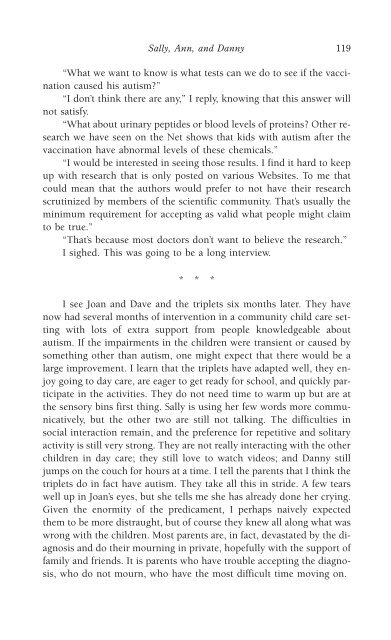978-1572305441
autism
autism
Create successful ePaper yourself
Turn your PDF publications into a flip-book with our unique Google optimized e-Paper software.
Sally, Ann, and Danny 119<br />
“What we want to know is what tests can we do to see if the vaccination<br />
caused his autism?”<br />
“I don’t think there are any,” I reply, knowing that this answer will<br />
not satisfy.<br />
“What about urinary peptides or blood levels of proteins? Other research<br />
we have seen on the Net shows that kids with autism after the<br />
vaccination have abnormal levels of these chemicals.”<br />
“I would be interested in seeing those results. I find it hard to keep<br />
up with research that is only posted on various Websites. To me that<br />
could mean that the authors would prefer to not have their research<br />
scrutinized by members of the scientific community. That’s usually the<br />
minimum requirement for accepting as valid what people might claim<br />
to be true.”<br />
“That’s because most doctors don’t want to believe the research.”<br />
I sighed. This was going to be a long interview.<br />
* * *<br />
I see Joan and Dave and the triplets six months later. They have<br />
now had several months of intervention in a community child care setting<br />
with lots of extra support from people knowledgeable about<br />
autism. If the impairments in the children were transient or caused by<br />
something other than autism, one might expect that there would be a<br />
large improvement. I learn that the triplets have adapted well, they enjoy<br />
going to day care, are eager to get ready for school, and quickly participate<br />
in the activities. They do not need time to warm up but are at<br />
the sensory bins first thing. Sally is using her few words more communicatively,<br />
but the other two are still not talking. The difficulties in<br />
social interaction remain, and the preference for repetitive and solitary<br />
activity is still very strong. They are not really interacting with the other<br />
children in day care; they still love to watch videos; and Danny still<br />
jumps on the couch for hours at a time. I tell the parents that I think the<br />
triplets do in fact have autism. They take all this in stride. A few tears<br />
well up in Joan’s eyes, but she tells me she has already done her crying.<br />
Given the enormity of the predicament, I perhaps naively expected<br />
them to be more distraught, but of course they knew all along what was<br />
wrong with the children. Most parents are, in fact, devastated by the diagnosis<br />
and do their mourning in private, hopefully with the support of<br />
family and friends. It is parents who have trouble accepting the diagnosis,<br />
who do not mourn, who have the most difficult time moving on.



